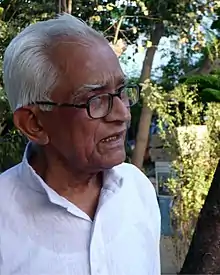Amritlal Vegad | |
|---|---|
 Vegad in 2013 | |
| Native name | अमृतलाल वेगड़ |
| Born | 3 October 1928 Madhapar |
| Died | 6 July 2018 (aged 89) Jabalpur |
| Occupation | Writer, essayist, poet |
| Nationality | Indian |
| Subject | Gujarati Hindi |
Amritlal Vegad (3 October 1928 – 6 July 2018) was a noted Gujarati and Hindi language writer and painter living in Jabalpur, Madhya Pradesh, India.[1][2][3]
Biography
Amritlal was born to Govamal Jivan Vegad, who was a railway contractor hailing from village Kumbhariya in Kutch belonging to a small but enterprising Mestri community of Kutch. Govamal Jivan settled in Jabalpur, while working as railway contractor for Bengal Nagpur Railway laying railway lines in Gondia – Jabalpur section in year 1906 with fellow Mistri contractors.[4]
Education
Amritlal Vegad did his studies from Visva Bharati University at Shantiniketan and was trained under able teachers like Nandalal Bose, during the years 1948 to 1953, from whom he learned to appreciate nature & its beauty.[2] He was trained in water colours but he painted also in oil colours.[2] After coming back to Jabalpur, he joined as teacher at Institute of Fine Arts in Jabalpur.[2] His story written as a students project, while studying at Shantinikaten – Introducing Ahimsa to the Battlefield has been a part of famous book – Gandhi-Ganga published in 1968.[4][5]
He died on 6 July 2018.[6]
Work
Amritlal Vegad was awarded in 2004 the Sahitya Akademi Award for his travelogue – Saundaryani Nadi Narmada[7] and also Madhya Pradesh Rajya Sahitya Award & Rashtrapati Award for his various works.[8][9] He is also a recipient of the Mahapandit Rahul Sankrityayan award in Hindi.[2]
The name of his most noted book is Narmada-ki-pari-krama written in Hindi language and Saundaryani Nadi Narmada (travelogue) & Parikramā Narmadā maiyānī in Gujarati language[10][11] for which he has earned several awards.[8] Further, he has also written folk tales & essays in Gujarati, like the book named Thodun sonun, thodun rupun.[12] Other books are "Amritasya Narmada" and "Teere Teere Narmada". These books have been translated into Gujarati (by himself), English, Bengali and Marathi.[2]
He has written these books from his personal foot travel along the banks of Narmada, which he has been doing now for more than three decades, starting from its origin point at Amarkantak to its final discharge at sea near Bharuch. His first book was Narmada – River of Beauty.[13] He started his first foot-travel along the route of river Narmada known as parikrama in 1977 aged 49 and did his last parikrama of river in 1999 aged of 71.[2] He was accompanied in all his travel by his wife, who would carry her load herself.[4]
His books are adorned with sketches and collages made by him personally, during the travel, which have been widely appreciated as works of art by critics at exhibitions.[14]
Amritlal Vegad was also noted for his works as an environmental activist, raising the issues of pollution of rivers like Narmada and others in State of Madhya Pradesh. He was the President of Narmada Samagra, an institution working against pollution of rivers and improving the facilities of public toilet and baths, along bathing ghats of rivers, in an effort to improve sanitation and reduce pollution of river banks and river waters.[15]
References
- ↑ National exhibition of art , Volume 39. Lalit Kala Akademi. 1996. p. 103.
- 1 2 3 4 5 6 7 "River of life and learning – chat For Amritlal Vegad, painting, collages and writings on the River Narmada are part of a reverent journey by PARUL SHARMA SINGH". The Hindu. 25 February 2011. Retrieved 12 July 2012.
- ↑ "નર્મદા પરિક્રમાના અનુભવો – અમૃતલાલ વેગડ". April 8, 2006. ReadGujarati.com. 8 April 2006. Retrieved 12 July 2012.
- 1 2 3 Kutch Gurjar Kshatriya Samaj : A brief History & Glory :by Raja Pawan Jethwa. (2007) pp : 24 – Shri Amritlal G. Vegad – Jabalpur (Life-sketch).
- ↑ "Gandhi Ganga (Inspiring Stories): Complete Book Online". www.mkgandhi.org.
- ↑ Deewan, Deepak (6 July 2018). "breaking news- ख्यातिनाम चित्रकार और नर्मदा यायावर अमृत लाल वेगड़ नहीं रहे, शोक में डूबी संस्कारधानी". patrika.com (in Hindi). Retrieved 6 July 2018.
- ↑ Darpan, Pratiyogita (2005). Competition Science Vision Feb 2005. p. 1561.
- 1 2 Gaur, Mahendra (2007). Indian Affairs Annual, Volume 2 By Mahendra Gaur. p. 41. ISBN 9788178354347.
- ↑ "मानसिक हलचल: अमृतलाल वेगड़ उवाच". Archived from the original on 3 July 2013. Retrieved 12 July 2012.
- ↑ Parikramā Narmadā maiyānī. 2003.
- ↑ Saundaryani nadi Narmada by Amrutlal Vegad (2006)
- ↑ Thodun sonun, thodun rupun (2003)
- ↑ Narmada – River of Beauty he Source of the Narmada To Bharuch : Where It Empties into The Arabian Sea.
- ↑ Bhaṭṭa, Dhruva (2001). Samudrantike By Dhruva Bhaṭṭa. ISBN 9788126011582.
- ↑ Changing Rooms on Narmada Banks – Shri Amritlal Vegad, President Narmada Samagra, Writer and Painter, said.. Archived 9 May 2012 at the Wayback Machine